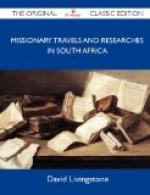Elephants were still abundant, but more wild, as they fled with great speed as soon as we made our appearance. The country between Mburuma’s and his mother’s village was all hilly and very difficult, and prevented us from traveling more than ten miles a day. At the village of Ma Mburuma (mother of Mburuma), the guides, who had again joined us, gave a favorable report, and the women and children did not flee. Here we found that traders, called Bazunga, have been in the habit of coming in canoes, and that I was named as one of them. These I supposed to be half-caste Portuguese, for they said that the hair of their heads and the skin beneath their clothing were different from mine. Ma Mburuma promised us canoes to cross the Loangwa in our front. It was pleasant to see great numbers of men, women, and boys come, without suspicion, to look at the books, watch, looking-glass, revolver, etc. They are a strong, muscular race, and both men and women are seen cultivating the ground. The soil contains so much comminuted talc and mica from the adjacent hills that it seems as if mixed with spermaceti. They generally eat their corn only after it has begun to sprout from steeping it in water. The deformed lips of the women make them look very ugly; I never saw one smile. The people in this part seem to understand readily what is spoken about God, for they listen with great attention, and tell in return their own ideas of departed spirits. The position of the village of Mburuma’s mother was one of great beauty, quite inclosed by high, steep hills; and the valleys are all occupied by gardens of native corn and maize, which grow luxuriantly. We were obliged to hurry along, for the oxen were bitten daily by the tsetse, which, as I have before remarked, now inhabits extensive tracts which once supported herds of cattle that were swept off by Mpakane and other marauders, whose devastations were well known to Sekwebu, for he himself had been an actor in the scenes. When he told me of them he always lowered his voice, in order that the guides might not hear that he had been one of their enemies. But that we were looked upon with suspicion, on account of having come in the footsteps of invaders, was evident from our guides remarking to men in the gardens through which we passed, “They have words of peace—all very fine; but lies only, as the Bazunga are great liars.” They thought we did not understand them; but Sekwebu knew every word perfectly; and, without paying any ostensible attention to these complimentary remarks, we always took care to explain ever afterward that we were not Bazunga, but Makoa (English).




